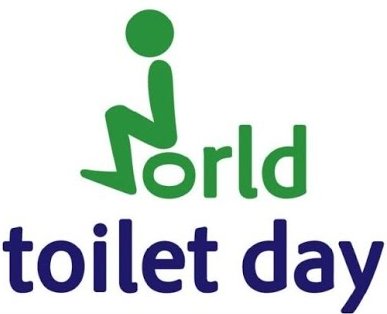 The Unite Nations points out that - "2.4 billion People do not have adequate sanitation. 1 billion people still defecate in the open. Poor sanitation increases the risk of disease and malnutrition, especially for women and children. Women and girls risk rape and abuse, because they have no toilet that offers privacy."
The Unite Nations points out that - "2.4 billion People do not have adequate sanitation. 1 billion people still defecate in the open. Poor sanitation increases the risk of disease and malnutrition, especially for women and children. Women and girls risk rape and abuse, because they have no toilet that offers privacy."
2022
This year, the World Toilet Day focuses on
"Making the invisible visible"
... focusing on impacts of the sanitation crisis on groundwater, exploring how inadequate sanitation systems spread human waste into rivers, lakes and soil, polluting underground water resources.
The aim of World Toilet Day is to raise awareness about the people in the world who don’t have access to a toilet, despite the fact that it is a human right to have clean water and sanitation.“
On this day people are encouraged to take action and help promote the idea that more needs to be done - so that everyone worldwide must have access to a toilet.
| Sustainable Development Goals
Goal 6: Ensure access to water and sanitation for all
Clean, accessible water for all is an essential part of the world we want to live in. There is sufficient fresh water on the planet to achieve this. But due to bad economics or poor infrastructure, every year millions of people, most of them children, die from diseases associated with inadequate water supply, sanitation and hygiene.
The initiative builds on the strong commitment already made by UN Member States. The “Sanitation for All’ Resolution (A/RES/67/291) was adopted by the United Nations General Assembly in July 2013, designating 19 November as World Toilet Day. The Day is coordinated by UN-Water in collaboration with Governments and relevant stakeholders.
For more information, see GDRC's special feature on the SDGs
|
Did you know?
- Over half of the global population or 4.2 billion people lack safe sanitation.
- 40% – or three billion people – of the global population live without basic handwashing facilities with soap and water available at home.
- Around 297,000 children under five – more than 800 every day – die annually from diarrhoeal diseases due to poor hygiene, poor sanitation or unsafe drinking water.
- Globally, 80% of the wastewater generated by society flows back into the ecosystem without being treated or reused.
- By 2050, up to 5.7 billion people could be living in areas where water is scarce for at least one month a year, creating unprecedented competition for water.
 |
The 2030 Agenda (SDGs) calls on us to renew our efforts in providing access to adequate sanitation worldwide. We must continue to educate and protect communities at risk, and to change cultural perceptions and long-standing practices that hinder the quest for dignity.
Former UN Secretary-General Ban Ki-moon
|
 |
 |
GDRC has been working on themes related to this international day/observance, in its programme on Urban Environmental Mnagement (Sustainable Sanitation)
GDRC therefore reaffirms its committment to uphold the objectives of the World Toilet Day, and work towards better understanding of, and action on, promoting and protecting sustainable sanitation, particularly in developing countries.
|
|
Additional Resources:
|
|

